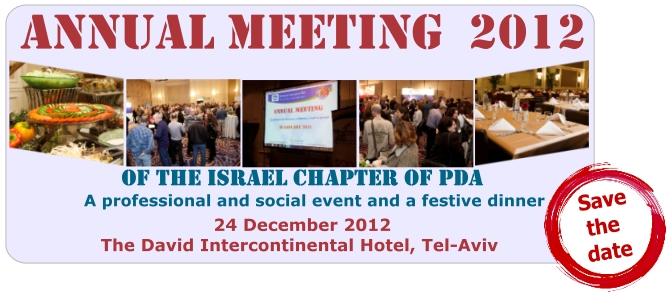|
 |
PDA seminar on
Methods Development and Validation
with a scientific approach
and Risk based Strategy
by Dr. Shib Mookherjea, USA
26 December 2012
08:00-18:00
Kfar Macabbiah, Ramat Gan
Key Topics
- An overview of global compliance issues, global harmonization initiatives, role of ICH, relevance of Validation activities & the Paradigm Shift
- Quality Control and Quality Assurance in Analytical, R&D, QC, PD laboratories: General considerations, Quality Systems, QC procedures, QA oversight, Process Control measure.
- Perspectives of ICH ISO Integration: ICH Q1 (Stability Studies), Q2 (Analytical Methods), Q3 (Impurities), Q7 (Pharma Process ), Q9 (Risk Assessment), Q10 (Quality Systems), etc.
- Measurement, Measurement Uncertainty, Measurement Resolution, Total Error, Bias
- Analytical measurement: Process Model & Risk Assessment (REMS)
- A generic, science based outline of Methods Development & Validation [ab initio]
- Perspectives of QbD, PAT Directives: On-Line Measurements vs. Off-Line
- Validation Parameters, their generic definitions, and their practical applications to various methods
- Highlights of the guidelines derived from International standards – ISO 17025, AOAC, WHO, GLP, GMP, EMEA, USP/EP/JP, etc.
- Standardization/Qualification/Verification/Validation: the implicit continuum
- A generic approach to analytical method optimization during development
- Some case histories and applications for improvement of validation characteristics
- Data integrity and statistical evaluation of analytical data: SQC, Control Charts
- Methods development and optimization in HPLC, UV-VIS including assessment of peak purity, as examples of the most recent techniques widely used in analytical laboratories
- Methods Validation & Regulatory submissions: IND/ ANDA/ NDA/ CMC
- Method Development and validation by examples (Group Exercise): How to systematically develop and validate an assay for a trace component in a very complex sample matrix, develop the schematic template of a Validation Protocol
- Perspectives of Qualification of various analytical Systems (IQ, OQ, PQ) GAMP, USP
General Information & Course Outline
Learn the Methods Validation concepts with a scientific approach and understand basic elements of analytical method from Quality Systems and measurement, errors and uncertainties. Goal oriented method development with generic, iterative and modular approach to understand validation and establish boundaries of the performance characteristics of analytical method during development. Various stages of the method followed by strategy of design, development and optimization presented. USP, ICH, AOAC guidance will be discussed. Presentation builds on data handling, documentation and regulatory requirements. Extensive guidance for preparing Methods Validation Protocols for the various stages of regulatory submissions, e.g. IND, NDA , CMC. Various aspects of Laboratory Controls, QC procedures, SOPS covering Calibration/ Standardization/ Qualification/ Validation will be included along with Statistical tools, SQC, SPC for monitoring of data . Strategies for the development Stability Indicating assays are included. This course is highly interactive and participative. Attendees are encouraged to be prepared to bring examples of analytical development and validation issues to be discussed during the Workshop.
Who Should Attend
Scientists, managers, R&D personnel, quality assurance and quality control staff and managers, validation coordinators, production and packaging personnel, regulatory/compliance managers, warehouse managers, distribution chain, qualified persons (EMEA), distributors, pharmaceutical, supply and purchasing managers, shippers.
Benefits
- Increase your knowledge of conformity assessment, QC/QA in the pharmaceutical laboratory.
- Increase your knowledge about cGMP/EMEA/ICH/WHO compliance issues.
- Consult with a knowledgeable instructor about your current technical problems and preparation and requirements for submission of regulatory packages (NDA, ANDA, IND, MMA and others for FDA & OECD).
- Learn a generic approach for developing an analytical method and optimizing it.
- Become acquainted with practical approaches for validating new analytical procedures.
- Familiarize yourself with methods development and optimization in HPLC.
- Be exposed to the latest international requirements and guidelines: ICH, ISO 17025, OECD, & FDA guidelines for analytical validation.
- Learn about the FDA’s new initiatives in systems-based inspection and risk-based assessment.
- Understand the training and supervision requirements of chemists and technicians and other lab personnel for GLP.
- Receive helpful hints to help prepare you for a visit from an auditor’s perspective.
- Learn about general validation and qualification requirements for analytical instruments such as HPLC, TOC, CE, LC-MS, AA, UC/VIS, Dissolution and other emerging techniques.
About the Speaker
Dr. Shib Mookherjea
 Shib Mookherjea has a proven track record in analytical problem solving, R&D and extensive accomplishments in the areas of Pharmaceutical Development, (ICH Q6, Q7A, Q8), Management of QA/QC, Process Upgrade, CpK monitoring, PAT applications, Validation in the laboratory (Methods, Systems, Equipment Qualification). The diversity of experience in various settings have included leading teams in R&D, QC providing developmental and ongoing support for dosage forms, in process materials, excipients, generic drugs, biotech products, MaBs , Medical Devices, etc. He has held positions of increasing responsibilities starting as an analytical scientist and management positions within Pharma, Biotech/Device industries with companies like BASF, Colgate Palmolive, Johnson & Johnson, Troy Corporation, CRO/CMO Laboratories and most recently as a Senior Manager of Analytical Development for Allergan located in California. Dr. Mookherjea is a highly-recognized speaker in domestic US and international forums and is the Principal of Validation Quality International I, (www.valqualintl.com) based in California, USA. Shib Mookherjea has a proven track record in analytical problem solving, R&D and extensive accomplishments in the areas of Pharmaceutical Development, (ICH Q6, Q7A, Q8), Management of QA/QC, Process Upgrade, CpK monitoring, PAT applications, Validation in the laboratory (Methods, Systems, Equipment Qualification). The diversity of experience in various settings have included leading teams in R&D, QC providing developmental and ongoing support for dosage forms, in process materials, excipients, generic drugs, biotech products, MaBs , Medical Devices, etc. He has held positions of increasing responsibilities starting as an analytical scientist and management positions within Pharma, Biotech/Device industries with companies like BASF, Colgate Palmolive, Johnson & Johnson, Troy Corporation, CRO/CMO Laboratories and most recently as a Senior Manager of Analytical Development for Allergan located in California. Dr. Mookherjea is a highly-recognized speaker in domestic US and international forums and is the Principal of Validation Quality International I, (www.valqualintl.com) based in California, USA.
Participation fees:
PDA members - 1600 NIS
Non members - 1800 NIS
 Registration is mandatory, please register here Registration is mandatory, please register here
For full map please click here

|
| |
|
|
|
|
|